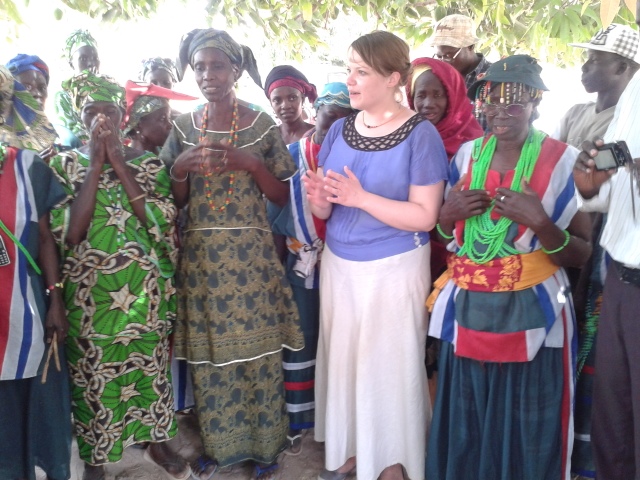On our VSO induction timetable today was scheduled as the "community experience". This meant a trip south for about 1 3/4 hours to a village called Ndemba. I was at the corner of the street by the early-for-a-Saturday time of 8 am, whistling an appropriate George Formby song and reassuring passing taxi drivers that I didn't need their assistance today. After a brief chat with passing Janneke, on her way to another village for work, I jumped into a smart looking van at 8.25, greeting the waiting VSO staff and fellow volunteers. We continued the pick ups and, when we were all present and correct, the VSO staff handed round breakfast of sandwiches and water. The breakfast sandwiches of the Kombos are a thing to see; there are stalls around the area with a seller, usually a woman, a pile of crusty French style bread (Tapalapa) and various fillings. They're much more like a British lunch than breakfast, and are enormous, half is more than enough. The fillings could be steak, bean, liver, shrimp, chicken or a kind of fried beanballs, often with salad, mayonnaise and ketchup. This morning my steak tapalapa did a great job of easing the post anti-malarial nausea.
The journey itself was interesting, driving south past sights including the airport (last seen at 5am), Brikama, where Jonson and Yaap will work, and the entrance to on of the NYSS training centres which is a farm. We also saw empty rice paddies which will be cultivated when the rain comes, cashew plantations (a major cash crop), and palm trees. This country certainly manages to be very beautiful. However, having been nominated to give a vote of thanks I missed some sights in a bid to rehearse my now quadrilingual speech.
Arriving in Ndemba as strangers our first task, as it would be in any village, is to greet the Alkalo, the village head. The Elders came to greet us too, alongside members of the Village Development Committee. As we sat under an enormous mango tree a group of women carrying a Cora, singing and clapping danced their way towards us. We were treated to a welcome song and the Gambian national anthem. It was fairly breathtaking and the women's lack of any inhibition countered our own slight culture shock.
The Alkalis (there're two in Ndemba), elders, VDC and community then hosted a Q&A session for us. After feeling very proud for introducing myself without the beed for a translator, I asked a question about how the women's structures are organised which caused a bit of commotion to work out which woman would speak, as many were keen to explain. It was soon sorted and we heard about the community garden which we later visited. My second question on saving up for the irrigation system the women said would help them revealed that there's a kind of community saving scheme to pay for some development, as well as a structure like a credit union and development grants from the local council.
There are a few income sources for the village and its inhabitants. We walked to the river via a cassava farm and an Eco-tourism lodge, and back via a freshwater spring, bee hive and the garden. There's also a bus run by the VDC for the local area. At the river a few of the children jumped in. "Come swimming" one shouted at me and I was very tempted given the soaring temperature. The river is saltwater too so the risk of parasites is lower, though apparently they do get crocodiles. I regretfully decided to stay professional and learn about the boat that can take produce and people from here to the capital instead.
Returning to the welcome shade of the mango tree we sat to wait for lunch and prayers. Aisah went to speak to the dancing women and, unable to resist, I went to join them. We were soon singing and clapping along to the Cora, which rapidly became about half an hour of dancing, stamping in a circle and improvising various harmonies and words via my trusty "read lips and smile". I even tried to teach some of the women a version of Syahamba and we laughed with each other until food arrived.
Our dancing friends invited us to eat with them, a central point of Gambian table manners. Using our right hands we took small amounts of rice and fish sauce. It didn't take long for someone to wordlessly pass me a cloth to use essentially as a bib/apron as my inexpert technique was frankly terrible. I must have looked like a small child learning to eat! We asked them to join us at our bowls of Benacin and Domida with cous (like sourgum) and were soon "bon poyin", spelling uncertain but Jola for full. I told them my sister Katharine would appreciate that one, given "embonpoint" is a favourite term of hers.
Finally, we had a chance to pray with and talk to the village development committee after which we were told to consider ourselves as honorary citizens and to always know that wherever we are we have another village waiting for us there. All that was left was then to dance the day away and get a few more corrections to my very limited Jola vocabulary. Jumping back in the van the heat and sun was weighing heavily on us all but with an elation of a day spent in wonderful, interesting and joyful company.
[photos: Kadambari, Longworth, Watts]





No comments:
Post a Comment